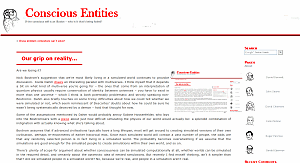 Are we losing it?
Are we losing it?
Nick Bostrom’s suggestion that we’re most likely living in a simulated world continues to provoke discussion. Joelle Dahm draws an interesting parallel with multiverses. I think myself that it depends a bit on what kind of multiverse you’re going for – the ones that come from an interpretation of quantum physics usually require conservation of identity between universes – you have to exist in more than one universe – which I think is both potentially problematic and strictly speaking non-Bostromic. Dahm also briefly touches on some tricky difficulties about how we could tell whether we were simulated or not, which seem reminiscent of Descartes’ doubts about how he could be sure he wasn’t being systematically deceived by a demon – hold that thought for now.
Some of the assumptions mentioned by Dahm would probably annoy Sabine Hossenfelder, who lays into the Bostromisers with a piece about just how difficult simulating the physics of our world would actually be: a splendid combination of indignation with actually knowing what she’s talking about.
Bostrom assumes that if advanced civilisations typically have a long lifespan, most will get around to creating simulated versions of their own civilisation, perhaps re-enactments of earlier historical eras. Since each simulated world will contain a vast number of people, the odds are that any randomly selected person is in fact living in a simulated world. The probability becomes overwhelming if we assume that the simulations are good enough for the simulated people to create simulations within their own world, and so on.
There’s plenty of scope for argument about whether consciousness can be simulated computationally at all, whether worlds can be simulated in the required detail, and certainly about the optimistic idea of nested simulations. But recently I find myself thinking, isn’t it simpler than that? Are we simulated people in a simulated world? No, because we’re real, and people in a simulation aren’t real.
When I say that, people look at me as if I were stupid, or at least, impossibly naive. Dude, read some philosophy, they seem to say. Dontcha know that Socrates said we are all just grains of sand blowing in the wind?
But I persist – nothing in a simulation actually exists (clue’s in the name), so it follows that if we exist, we are not in a simulation. Surely no-one doubts their own existence (remember that parallel with Descartes), or if they do, only on the kind of philosophical level where you can doubt the existence of anything? If you don’t even exist, why do I even have to address your simulated arguments?
I do, though. Actually, non-existent people can have rather good arguments; dialogues between imaginary people are a long-established philosophical method (in my feckless youth I may even have indulged in the practice myself).
But I’m not entirely sure what the argument against reality is. People do quite often set out a vision of the world as powered by maths; somewhere down there the fundamental equations are working away and the world is what they’re calculating. But surely that is the wrong way round; the equations describe reality, they don’t dictate it. A system of metaphysics that assumes the laws of nature really are explicit laws set out somewhere looks tricky to me; and worse, it can never account for the arbitrary particularity of the actual world. We sort of cling to the hope that this weird specificity can eventually be reduced away by titanic backward extrapolation to a hypothetical time when the cosmos was reduced to the simplicity of a single point, or something like it; but we can’t make that story work without arbitrary constants and the result doesn’t seem like the right kind of explanation anyway. We might appeal instead to the idea that the arbitrariness of our world arises from it’s being an arbitrary selection out of the incalculable banquet of the multiverse, but that doesn’t really explain it.
I reckon that reality just is the thing that gets left out of the data and the theory; but we’re now so used to the supremacy of those two we find it genuinely hard to remember, and it seems to us that a simulation with enough data is automatically indistinguishable from real events – as though once your 3D printer was programmed, there was really nothing to be achieved by running it.
There’s one curious reference in Dahm’s piece which makes me wonder whether Christof Koch agrees with me. She says the Integrated Information Theory doesn’t allow for computer consciousness. I’d have thought it would; but the remarks from Koch she quotes seem to be about how you need not just the numbers about gravity but actual gravity too, which sounds like my sort of point.
Regular readers may already have noticed that I think this neglect of reality also explains the notorious problem of qualia; they’re just the reality of experience. When Mary sees red, she sees something real, which of course was never included in her perfect theoretical understanding.
I may be naive, but you can’t say I’m not consistent…
